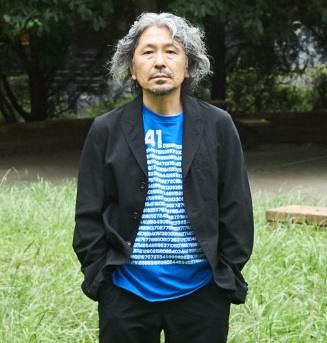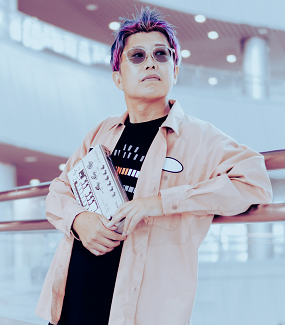Record Project “Side A / Side B ~ Conversation & Music”
- Date: Saturday, October 1, 2022
- Time: 5:15pm – 6:30pm (Doors open 5pm)
- Venue:the multi-purpose lecture room in the basemant of Building No.26
- Special Guests: Hideo Furukawa, Shutoku Mukai
- Language:Japanese
- Participant:All ages, Public Welcome. Limited Seating Available.
- Participation:Free, Please submit an application to reserve space at the link below (English link not available):
https://forms.gle/MoRRsXam54TmRshE9
Applications close 10am Friday September 23
If there are more applicants than seats available, reservations will be decided by lottery. - Organized by the Yanai Initiative, with support from the Waseda International House of Literature
★Seminar participants will not be able to tour the Waseda International House of Literature.
Event Description
Hideo Furukawa lets loose with words. Shutoku Mukai replies in song. “Literature” and “Music” collide.
Furukawa and Mukai will enter the WIHL studio to set down a live recording. A disc cutting lathe will cut their words and music directly to vinyl, creating a single record of the event. What kind of record will these two artists cut using a mix of literature and music?
Side A (20 minutes): Conversation, with a bit of music
Side B (20 minutes): Music, with a bit of conversation
…perhaps. This is a real “open recording” session. Make your reservation to watch the results cut live in studio.
Hideo Furukawa

By Eisuke ASAOKA
Writer. Born in Fukushima Prefecture in 1966. Furukawa made his literary debut in 1998 and has gone on to write everything from flash fiction to mega-novels, stage plays to essays, and recently nonfiction. His prolific public readings often include performers from other arts, including previous performances with Shutoku Mukai. See more at Furukawa’s home page:
https://furukawahideo.com
Shutoku Mukai
Musician. Born in Saga Prefecture in 1973. Mukai formed the band Number Girl in 1995, releasing their major label debut in 1999. He went on to form the band Zazen Boys in 2002. He now runs his own studio, Matsuri Studio, performs globally, and has released four albums with Zazen Boys. See more at Mukai’s home page:
(mukaishutoku.com)
Atsushi Yamane: Altphonic Studio

Engineer. Altphonic Studio formed in 2004 to create music and videos. They have since recorded, mixed, and mastered major label recordings, TV and film audio, and produced commercials for a variety of industries. From 2016, Yamane began working in Berlin and work with many European clients. Returning to Japan in 2019, He now focuses on mastering and cutting analog records. See more at Altphonic Studio’s home page:
https://www.altphonic.com/
The Vinyl Renaissance, Ghosts of Digital Recording, Red Light Fever
Or, Why Cut Records in the Digital Age?
Vinyl records never died. 8 Tracks and cassette tapes, CDs and online streaming. New formats and technologies repeatedly failed to put the vinyl record in its grave. It is often said that we are now witnessing the age of the vinyl record’s renaissance. Records are no longer the DIY darling. They are not kept barely alive by underground singles. They are major, in every sense. They have seen a major cultural revival, they are back in the catalogs of major record labels, and their production is a major business.
Vinyl records never died, but every record made today contains a ghost. Trapped within each pressed sheet of plastic resides the soul of digital recording. When we set the needle down on a freshly opened record, we are listening to music that has been carefully tracked, edited, and mastered using the tools of the digital music revolution. No amount of tube amplifiers or vintage speakers can exorcise the ghost of digital production. The very meaning of the term “recording” has changed. When musicians enter the studio today, they intuitively know that each take is one piece of a larger puzzle. Every song is a collage of recordings and edits over weeks or months. They can select which track to keep, which to overdub, which to delete, which to copy and paste. When it comes to recording, the contemporary artist is inescapably digital native.
Records did not always have this ghost trapped within them. Even before recordings were produced with electricity, recordings were cut direct to disc (or cylinder) acoustically. It was not until the 1920s that the technology of sound recording experienced the electric revolution. The use of electrified microphones and recorders could capture more complex sounds and bigger bands. By the 1930s, technology to cut a lacquer disc live in studio ushered in the era of commercial music production and the music marketplace.
Records cut direct from a lathe were exactly that: recordings. They captured the live sound exactly as it was in the room. No edits, no deletions, no selections, no take-backs. When the red light in the studio flipped on, the sign that glowed “Recording” meant something different than it does today. Musicians and performers regularly experience a “red light fever”—an intense anxiety that the exact sound they produce in the moment will be captured by recording. Artists today can overcome this fever with retakes and computer assisted tools. Cut records grant no easy escape from the red light.
So, why cut records in the digital age?
The ubiquity of digital recordings has flooded our lives. Along with them, we have also been unwittingly reprogrammed according to their digital logic. A song can be autotuned, a video can be digitally modified, even this essay—which is going out to you now over the internet—can be edited and modified for clarity or meaning. Perhaps it already has been. How can we know?
When we write our tweets and texts, our emails, our presentations, our comments, we find a steady friend in the delete button. Just like music recordings, writing was once a process of permanently modifying a physical object to pass on some emotional content to the audience. Whether words were carved in stone or painted on with a brush, the creation of linguistic arts carried its own “red light syndrome.” There was no delete button to save you from your own words. And yet today, in both sound and language, our baseline expectation of a record is one that we can always modify when necessary.
But what happens when we deliberately choose a medium of recording that removes the possibility of retakes? What music or language would we choose to represent our art if we know that we no longer have the option to edit the final result?
These are the questions that motivate this record cutting event: In the age of the vinyl renaissance, is it possible to exorcise the medium’s digital ghost? Is it even desirable to do so? And when we make our attempt, what will we find in our red light fever?
We have invited the pioneering artists Mukai Shūtoku and Furukawa Hideo to cut a record live on a vinyl lathe to help explore these questions. Mukai, founding member of Number Girl and Zazen Boys, blends experimental rock with hip-hop syncopation to create a unique soundscape for his visionary lyrics. Furukawa Hideo is one of Japan’s most prolific novelists and writers. His fiction flows first and foremost from musicality and his dynamic live performances reimagine what it means to “read” and “write.” Together, they have already jammed with the ghosts of Japan’s historical past, giving a live concert of the epic Tale of the Heike. Now, they will confront new ghosts and produce a unique cut record of the live event. We look forward to seeing you under the red light.
Eric Siercks
Assistant Professor, Waseda International House of Literature
For Audience Members
- In order to enter WIHL, you will be asked to disinfect your hands and have your temperature checked.
- A mask must be worn at all times in WIHL.
- Please avoid coming to the event if you experience any of the following:
・You feel ill, have a fever or cough, feel body aches, have a cold, or feel otherwise unwell.
・You have recently been in close contact with someone who has tested positive for COVID-19 - Please note that videos, photographs, and audio recordings of the event will be taken. By participating in the event as an audience member, you understand that you may appear on WIHL or third party websites or in other media.
- Personal information will not be shared or used for other purposes.
Contact
For additional information regarding this event, please contact the Yanai Initiative office at the address below:
[email protected]
For more information on the Yanai Initiative: http://yanai-initiative.ucla.edu/ja
For more information on WIHL: https://www.waseda.jp/culture/wihl/en










